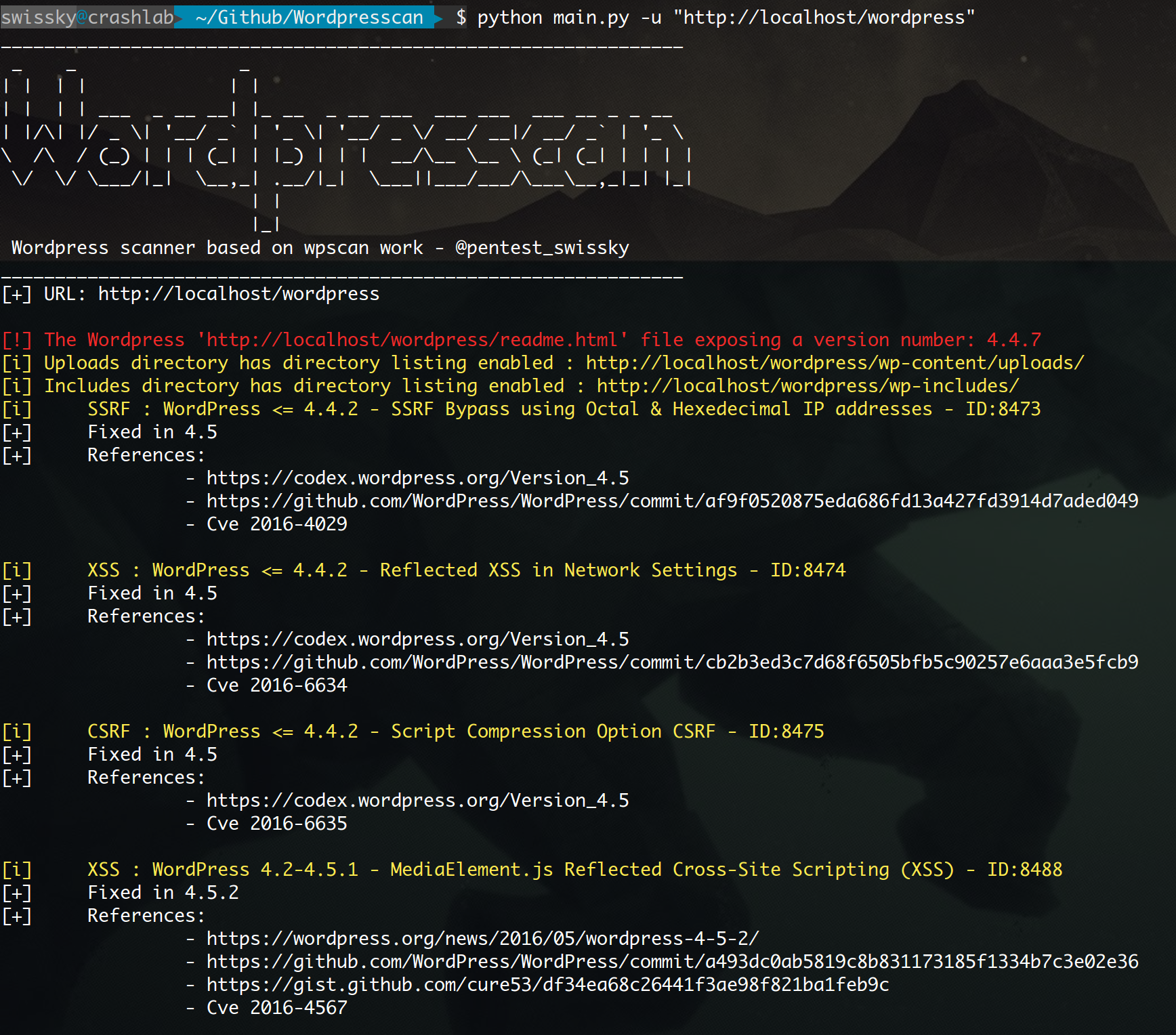|
|
||
|---|---|---|
| database | ||
| engine | ||
| fuzz | ||
| plugins | ||
| screens | ||
| .gitignore | ||
| README.md | ||
| main.py | ||
README.md
Wordpresscan
A simple Wordpress scanner written in python based on the work of WPScan (Ruby version)
Disclaimer
The author of this github is not responsible for misuse or for any damage that you may cause!
You agree that you use this software at your own risk.
Install & Launch
Dependencies
pip install requests
pip install tornado
Install
git clone https://github.com/swisskyrepo/Wordpresscan.git
cd Wordpresscan
Example 1 : Basic update and scan of a wordpress
python main.py -u "http://localhost/wordpress" --update --random-agent
-u : Url of the WordPress
--update : Update the wpscan database
--aggressive : Launch an aggressive version to scan for plugins/themes
--random-agent : Use a random user-agent for this session
Example 2 : Basic bruteforce (option --brute, option --nocheck)
python main.py -u "http://127.0.0.1/wordpress/" --brute fuzz/wordlist.lst
python main.py -u "http://127.0.0.1/wordpress/" --brute admin
--brute file.lst : Will bruteforce every username and their password
--brute username : Will bruteforce the password for the given username
it will also try to bruteforce the password for the detected users.
╭─ 👻 swissky@crashlab: ~/Github/Wordpresscan ‹master*›
╰─$ python main.py -u "http://127.0.0.1/wordpress/" --brute fuzz/wordlist.lst --nocheck
_______________________________________________________________
_ _ _
| | | | | |
| | | | ___ _ __ __| |_ __ _ __ ___ ___ ___ ___ __ _ _ __
| |/\| |/ _ \| '__/ _` | '_ \| '__/ _ \/ __/ __|/ __/ _` | '_ \
\ /\ / (_) | | | (_| | |_) | | | __/\__ \__ \ (_| (_| | | | |
\/ \/ \___/|_| \__,_| .__/|_| \___||___/___/\___\__,_|_| |_|
| |
|_|
WordPress scanner based on wpscan work - @pentest_swissky
_______________________________________________________________
[+] URL: http://127.0.0.1/wordpress/
[!] The Wordpress 'http://127.0.0.1/wordpress/readme.html' file exposing a version number: 4.4.7
[i] Uploads directory has directory listing enabled : http://127.0.0.1/wordpress/wp-content/uploads/
[i] Includes directory has directory listing enabled : http://127.0.0.1/wordpress/wp-includes/
[i] Bruteforcing all users
[+] User found admin
[+] Starting passwords bruteforce for admin
Bruteforcing - ▓▓▓▓▓▓▓▓▓▓▓▓▓▓▓▓▓▓▓▓▓▓▓▓▓▓▓▓▓▓▓▓▓░░░░░░░░░░░░░░░░░░░░░░░░░░░░░░░░░░░░░░░░░░░░░░░░░░░░
Example 3 : Thinking is overrated, this is aggressive, mostly not advised!
python main.py -u "http://127.0.0.1/wordpress/" --fuzz
[i] Enumerating components from aggressive fuzzing ...
[i] File: http://127.0.0.1/wordpress/license.txt - found
[i] File: http://127.0.0.1/wordpress/readme.html - found
[i] File: http://127.0.0.1/wordpress/wp-admin/admin-footer.php - found
[i] File: http://127.0.0.1/wordpress/wp-admin/css/ - found
[i] File: http://127.0.0.1/wordpress/wp-admin/admin-ajax.php - found
[i] File: http://127.0.0.1/wordpress/wp-activate.php - found
--fuzz : Will fuzz the website in order to detect as much file, themes and plugins as possible
Output example from a test environment
Credits and Contributor
- Original idea and script from WPScan Team
